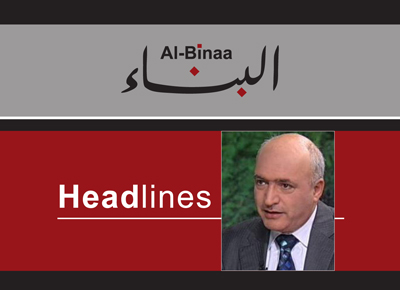Russian and American Delegations in Saudi Arabia, and Soon Trump and Putin for Ukraine Talks / After Gaza Imposed Its Will on Saturday… U.S.-Israeli Coordination to Obstruct Implementation
Qassem: Iranian Plane Blocked at Israel’s Request… Occupation Must Fully Withdraw Tomorrow

February 17, 2025
The political editor wrote
Washington’s special envoy to the Middle East, Steve Whitcoff, confirmed that a U.S. delegation arrived in Saudi Arabia yesterday for talks with Russian representatives regarding a settlement in Ukraine. He expressed optimism about making meaningful progress. In an interview with Fox News, Whitcoff stated, “I’m heading there with the National Security Advisor. We have meetings at the President’s direction, and I hope we achieve significant progress on Russia and Ukraine.”
Meanwhile, former U.S. President Donald Trump announced that he may meet Russian President Vladimir Putin in Saudi Arabia “very soon”. When asked by reporters about the timing of the potential meeting, Trump responded, “The date is not set, but it could happen very soon”. He emphasised Russia’s strength, reminding that it had defeated both Hitler and Napoleon. Trump also dismissed claims that Russia intends to provoke a war with NATO, stating unequivocally, “No, I don’t agree with that… I don’t believe it at all”.
In the region, the situation moved in the opposite direction. U.S. Secretary of State Marco Rubio’s visit to the occupying entity reinforced Israeli maneuvers to undermine the ceasefire agreement. This came after Gaza and its resistance forces compelled Israeli Prime Minister Benjamin Netanyahu to honour the scheduled prisoner exchange on Saturday. However, ambiguity has since returned to the agreement’s implementation, as Israel has refused to allow the entry of heavy machinery and prefabricated homes as stipulated. This raises the possibility that the resistance may withhold the planned prisoner exchange next Saturday.
Compounding the uncertainty are the complexities of the second phase of negotiations. While the U.S. envoy confirmed these talks will commence, all indications suggest that reaching an agreement is nearly impossible given the American-Israeli alignment on linking a permanent ceasefire to the complete political and military dismantling of Hamas. Israeli discussions now revolve around prolonging the first phase and pressuring Hamas into a vague interim stage that does not officially declare an end to the war, despite the agreement defining this as the purpose of the second phase. Instead, additional prisoner exchanges would take place under the guise of “allowing more time to discuss post-war arrangements”.
In Lebanon, tensions have escalated following the government’s decision to bar an Iranian plane from landing at Beirut’s Martyr Rafik Hariri International Airport. This move sparked protests and a peaceful sit-in called for by Hezbollah. The Lebanese Army’s handling of the demonstration drew scrutiny, particularly in light of Hezbollah’s condemnation of the rioting that had taken place the previous day, during which UNIFIL forces were attacked.
The justifications for blocking the Iranian flight, citing safety standards and Lebanese-European agreements, failed to convince many, especially since Iranian aircraft routinely land in and depart from airports in Saudi Arabia, Turkey, and the UAE, where aviation regulations are even stricter and ties with Europe are more established. Similarly unconvincing was the army’s rationale for dispersing the peaceful sit-in over road obstruction, as this could have been resolved through coordination with organisers. The stark contrast with the army’s leniency toward roadblocks during the October 17, 2019, protests, when demonstrators openly called for Nawaf Salam as prime minister and General Joseph Aoun as president, while cursing then-President Michel Aoun and the government, did not go unnoticed. Many of those who today defend the current administration had previously justified storming parliament as a legitimate act.
Against this backdrop, Hezbollah Secretary-General Sheikh Naim Qassem delivered a composed address, calling for consensus and mutual understanding. He reaffirmed Hezbollah’s support for the president and the party’s willingness to play a constructive role in government. Sheikh Qassem also revealed that the decision to block the Iranian flight was made after the Lebanese prime minister received a call conveying an Israeli threat. He urged the government to stand firm against intimidation, warning that Lebanon must not become a playground for Israeli dominance.
Regarding the looming Israeli withdrawal deadline, Sheikh Qassem insisted that the occupation must fully withdraw and that the Lebanese state must fulfill its responsibilities. Failure to do so, he cautioned, would usher in a new phase – one marked by occupation, and history is clear on how occupation is dealt with.




